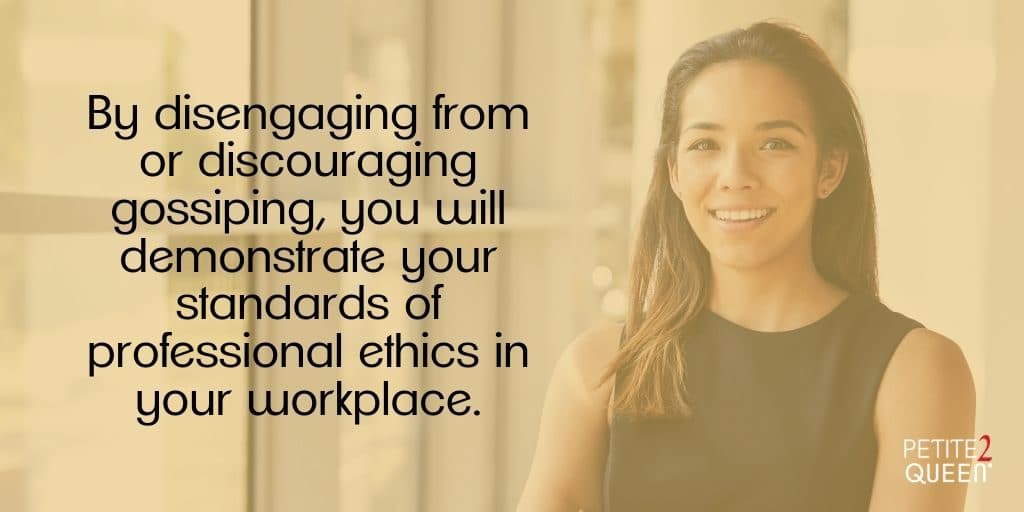Everyone knows that gossiping is an unflattering activity. Being known as the town or neighborhood gossip is not a desirable reputation, and it’s even less so in the workplace. Being the office gossip makes you less well-liked and -respected, making you more likely to be passed over for promotions. So stay genuine and positive!
Poison: Why Gossiping is Bad for You
Why not? Firstly, it’s petty and childish. Gossiping regularly shows poor restraint and a lack of consideration for others’ feelings. By airing other people’s dirty laundry to unrelated parties, you are subjecting them to humiliation and scorn. If you have ill will toward someone, perhaps talk with them to figure out why and how to fix it. When a co-worker makes you angry, discuss it with them or a supervisor to resolve the problem. Doing so will show your integrity, while simply gossiping with others demonstrates an unwillingness to handle challenges maturely.
Secondly, gossiping makes you less trustworthy. Think about it: Would you want to share stories and concerns with someone if you knew they were going to share it with 10 other people? Gossiping gives the appearance that you do not value others’ confidences. What goes in your ear will come straight out of your mouth, it might seem, so your co-workers will exclude you from important conversations. Losing out on your peers’ trust will not only prevent you from receiving pertinent information; it will also be an obstacle in securing good relationships with the people around you.

Thirdly, if losing out on positive relationships with your co-workers doesn’t concern you, then let the negative impact on your career motivate you to stop gossiping. If you are not trusted by your co-workers, why would your supervisors entrust you with sensitive information for a project? Climbing the corporate ladder (or any career ladder) requires you to demonstrate the ability to keep key details to yourself sometimes. Furthermore, gossiping shows a lack of maturity, and immature people are not ideal for managing teams. Having team members dislike and distrust you means they will be less willing to cooperate with your directives. Again, these are not good traits for a leader. Authenticity and integrity are.
Antidote: What to Do When a Co-Worker Gossips
So, you’re on board with the not-gossiping directive, but what do you do when a co-worker gossips to you? You don’t want to be impolite, but you don’t want to be an accomplice, either. It’s a delicate balance, but here is some advice.
If the co-worker is someone you don’t know very well, find a way to politely change the subject or end the conversation. Don’t partake by adding an additional story or acting thrilled by what they’re saying. Instead, say something positive about the person in question, bring up a different topic, or simply say you’re busy and need to get back to work. Avoid the gossiper, and make sure to keep your private life private. If it’s a recurring problem, you can tell them that their gossip makes you uncomfortable and that you would rather discuss something more pleasant or work-related. You might encourage them to take their concerns to the person in question, their supervisor, or HR. If the gossip gets out of hand, you might want to speak with your supervisor or HR yourself.

When the gossiper is a close co-worker or friend, you can challenge them more directly. When they gossip, comment that it’s mean to do so. Ask them why they are telling you this particular story. Again, if they persist, tell them that the gossip makes you uncomfortable. Your co-worker might be annoyed with you or get defensive, but you will be behaving like the respectful, positive person you are.
By disengaging from or discouraging gossiping, you will demonstrate your standards of professional ethics in your workplace. You will prove to the people around you that you can be trusted and counted on to be respectful of your co-workers. Supervisors will see you are mature, dependable, and kind, which are all good qualities in leaders. Remaining gracious will get you to your dream job.
Think Before You Speak
Gossiping is a toxic behavior that breeds distrust and bitterness, so steer clear and avoid it. Before you share a hurtful story or critical thoughts, ask yourself why you are sharing these things with this particular person. Consider what is gained versus what is lost by gossiping. We all slip up every now and then, but work to keep yourself genuine. When your peers gossip, communicate, passively or actively, that such behavior is unacceptable. Your hard work will pay back dividends in the trust you gain, the leadership roles you’re offered, and the positive relationships you build.

Rachel Whitbeck is the Director of Communications & DEI Advisor at Petite2Queen. She has a PhD in Sociology from the University of Limerick in Ireland. Rachel uses her experience in writing, editing, and research to develop content that appeals to and is reflective of the diverse millennial woman.

